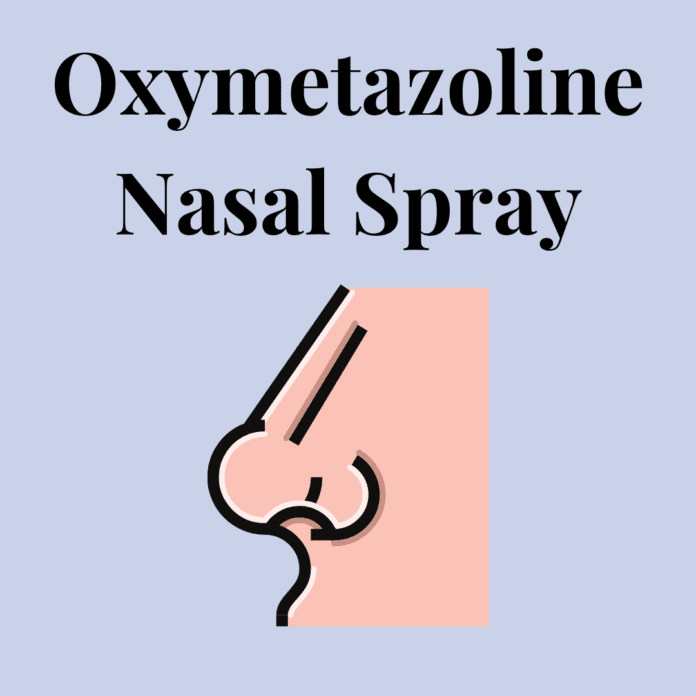Uses of Oxymetazoline Nasal Spray
Oxymetazoline nasal spray is used to relieve nasal discomfort caused by colds, allergies, and hay fever. It is also used to relieve sinus congestion and pressure. Oxymetazoline nasal spray should not be used to treat children younger than 6 years of age unless it is recommended by a doctor. Children 6 to 12 years of age should use oxymetazoline nasal spray carefully and under adult supervision. Oxymetazoline is in a class of medications called nasal decongestants. It works by narrowing the blood vessels in the nasal passages.
Side Effects of Oxymetazoline Nasal Spray
Oxymetazoline may cause side effects. Tell your doctor if any of these symptoms are severe or do not go away:
- burning
- stinging
- increased nasal discharge
- dryness inside the nose
- sneezing
- nervousness
- nausea
- dizziness
- headache
- difficulty falling asleep or staying asleep
Some side effects can be serious. If you experience any of these symptoms, call your doctor immediately:
- fast heartbeat
- slow heartbeat
Oxymetazoline nasal spray may cause other side effects. Call your doctor if you have any unusual problems while using this medication.
Warnings & Precautions
Before using oxymetazoline:
- tell your doctor and pharmacist if you are allergic to oxymetazoline, or any other medications.
- tell your doctor and pharmacist what prescription and nonprescription medications, vitamins, nutritional supplements, and herbal products you are taking or plan to take. Be sure to tell your doctor or pharmacist if you are taking the following medications or have stopped taking them within the past two weeks: isocarboxazid (Marplan), phenelzine (Nardil), selegiline (Eldepryl, Emsam, Zelapar), and tranylcypromine (Parnate).
- tell your doctor if you have or have ever had high blood pressure, diabetes, difficulty urinating due to an enlarged prostate gland, or thyroid or heart disease.
- tell your doctor if you are pregnant, plan to become pregnant, or are breast-feeding. If you become pregnant while using oxymetazoline nasal spray, call your doctor.
Dosage
Oxymetazoline comes as a solution (liquid) to spray into the nose. It is usually used every 10 to 12 hours as needed, but not more often than twice in a 24-hour period. Follow the directions on the package label or on your prescription label carefully, and ask your doctor or pharmacist to explain any part you do not understand. Use oxymetazoline nasal spray exactly as directed. Do not use more or less of it or use it more often than prescribed by your doctor or directed on the label.
If you use oxymetazoline nasal spray more often or for longer than the recommended period of time, your congestion may get worse or may improve but come back. Do not use oxymetazoline nasal spray for longer than 3 days. If your symptoms do not get better after 3 days of treatment, stop using oxymetazoline and call your doctor.
Oxymetazoline nasal spray is only for use in the nose. Do not swallow the medication.
To prevent the spread of infection, do not share your spray dispenser with anyone else. Rinse the tip of the dispenser with hot water or wipe it clean after you use it.
Follow the directions for using the nasal spray that appear on the package label. If you are using a product that comes in a pump dispenser, press down on the rim several times before using your first dose to prime the pump, according to the directions on the label. When you are ready to use the spray, hold your head upright without tilting and place the tip of the bottle in your nostril. For the nasal spray, squeeze the bottle quickly and firmly. For products that come in a pump dispenser, press down on the rim with a firm, even stroke, and breathe in deeply.
Other
Ask your pharmacist any questions you have about oxymetazoline nasal spray.
It is important for you to keep a written list of all of the prescription and nonprescription (over-the-counter) medicines you are taking, as well as any products such as vitamins, minerals, or other dietary supplements. You should bring this list with you each time you visit a doctor or if you are admitted to a hospital. It is also important information to carry with you in case of emergencies.
Source
All information has been provided courtesy of MedLinePlus from the National Library of Medicine and from the FDA.



